
The Final Solution or the Final Solution to the Jewish Question was a Nazi plan for the genocide of individuals they defined as Jews during World War II. The "Final Solution to the Jewish question" was the official code name for the murder of all Jews within reach, which was not restricted to the European continent. This policy of deliberate and systematic genocide starting across German-occupied Europe was formulated in procedural and geopolitical terms by Nazi leadership in January 1942 at the Wannsee Conference held near Berlin, and culminated in the Holocaust, which saw the murder of 90% of Polish Jews, and two-thirds of the Jewish population of Europe.

Kristallnacht (German pronunciation:[kʁɪsˈtalnaχt]lit. 'crystal night') or the Night of Broken Glass, also called the November pogrom(s) (German: Novemberpogrome, pronounced[noˈvɛm.bɐ.poˌɡʁoːmə] ), was a pogrom against Jews carried out by the Nazi Party's Sturmabteilung (SA) and Schutzstaffel (SS) paramilitary forces along with some participation from the Hitler Youth and German civilians throughout Nazi Germany on 9–10 November 1938. The German authorities looked on without intervening. The euphemistic name Kristallnacht comes from the shards of broken glass that littered the streets after the windows of Jewish-owned stores, buildings, and synagogues were smashed. The pretext for the attacks was the assassination of the German diplomat Ernst vom Rath by Herschel Grynszpan, a 17-year-old German-born Polish Jew living in Paris.
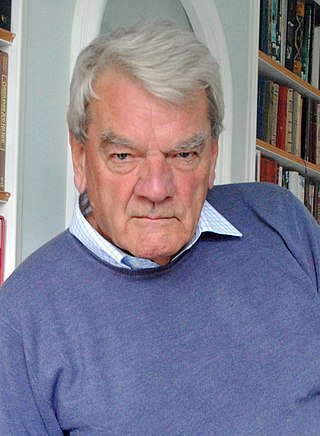
David John Cawdell Irving is an English author who has written on the military and political history of World War II, especially Nazi Germany. He was found to be a Holocaust denier in a UK court in 2000 as a result of a failed libel case.

Aloisius Joseph Muench was an American prelate of the Roman Catholic Church. He served as Bishop of Fargo from 1935 to 1959, and as Apostolic Nuncio to Germany from 1951 to 1959. He was elevated to the cardinalate in 1959.

The Destruction of the European Jews is a 1961 book by historian Raul Hilberg. Hilberg revised his work in 1985, and it appeared in a new three-volume edition. It is largely held to be the first comprehensive historical study of the Holocaust. According to Holocaust historian, Michael R. Marrus, until the book appeared, little information about the genocide of the Jews by Nazi Germany had "reached the wider public" in both the West and the East, and even in pertinent scholarly studies it was "scarcely mentioned or only mentioned in passing as one more atrocity in a particularly cruel war".
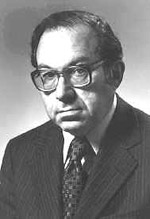
Raul Hilberg was a Jewish Austrian-born American political scientist and historian. He was widely considered to be the preeminent scholar on the Holocaust. Christopher R. Browning has called him the founding father of Holocaust Studies and his three-volume, 1,273-page magnum opus, The Destruction of the European Jews, is regarded as seminal for research into the Nazi Final Solution.
This is a selected bibliography and other resources for The Holocaust, including prominent primary sources, historical studies, notable survivor accounts and autobiographies, as well as other documentation and further hypotheses.

Sir Ian Kershaw is an English historian whose work has chiefly focused on the social history of 20th-century Germany. He is regarded by many as one of the world's foremost experts on Adolf Hitler and Nazi Germany, and is particularly noted for his biographies of Hitler.
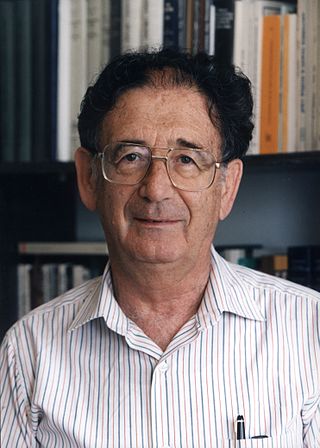
Yehuda Bauer is a Czech-born Israeli historian and scholar of the Holocaust. He is a professor of Holocaust Studies at the Avraham Harman Institute of Contemporary Jewry at the Hebrew University of Jerusalem.
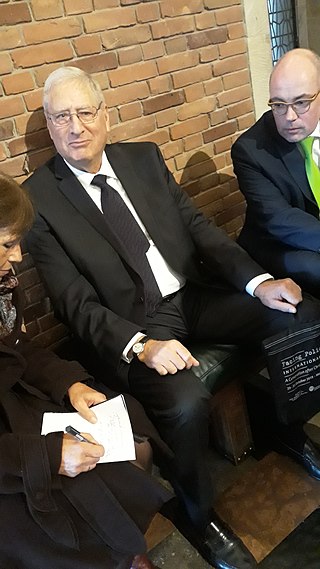
Christopher Robert Browning is an American historian and is Professor Emeritus of History at the University of North Carolina at Chapel Hill (UNC). A specialist on the Holocaust, Browning is known for his work documenting the Final Solution, the behavior of those implementing Nazi policies, and the use of survivor testimony. He is the author of nine books, including Ordinary Men (1992) and The Origins of the Final Solution (2004).
The functionalism–intentionalism debate is a historiographical debate about the reasons for the Holocaust as well as most aspects of the Third Reich, such as foreign policy. It essentially centres on two questions:
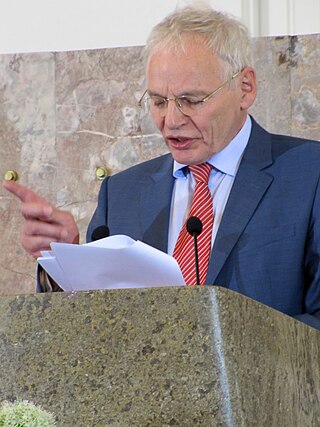
Götz Haydar Aly is a German journalist, historian and political scientist.

Eberhard Jäckel was a German historian. In the 1980s, he was a principal protagonist in the Historians' Dispute (Historikerstreit) over how to incorporate Nazi Germany and the Holocaust into German historiography and over Hitler's intentions.
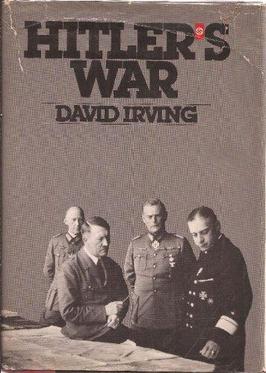
Hitler's War is a biographical book by British neo-Nazi author and Holocaust denier David Irving. It describes the Second World War from the point of view of Nazi Germany’s leader Adolf Hitler.
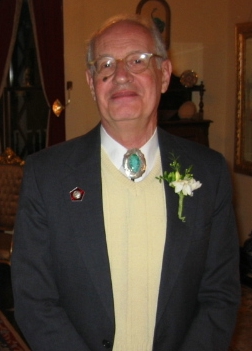
Gerhard Ludwig Weinberg is a German-born American diplomatic and military historian noted for his studies in the history of Nazi Germany and World War II. Weinberg is the William Rand Kenan, Jr. Professor Emeritus of History at the University of North Carolina at Chapel Hill. He has been a member of the history faculty at UNC-Chapel Hill since 1974. Previously he served on the faculties of the University of Michigan (1959–1974) and the University of Kentucky (1957–1959).

Heinz Peter Longerich is a German professor of history and historian. He is regarded by Ian Kershaw, Richard Evans, Timothy Snyder, Mark Roseman and Richard Overy, as one of the leading German authorities on the Holocaust.
Responsibility for the Holocaust is the subject of an ongoing historical debate that has spanned several decades. The debate about the origins of the Holocaust is known as functionalism versus intentionalism. Intentionalists such as Lucy Dawidowicz argue that Adolf Hitler planned the extermination of the Jewish people as early as 1918 and personally oversaw its execution. However, functionalists such as Raul Hilberg argue that the extermination plans evolved in stages, as a result of initiatives that were taken by bureaucrats in response to other policy failures. To a large degree, the debate has been settled by acknowledgement of both centralized planning and decentralized attitudes and choices.
Critical responses to Holocaust denier David Irving have changed dramatically as Irving, a writer on the subject of World War II and Nazism, changed his own public political views; further, there are doubts as to how far Irving applies the historical method. This article documents some of these critical responses over the course of his writing career.

This is a list of books about Nazi Germany, the state that existed in Germany during the period from 1933 to 1945, when its government was controlled by Adolf Hitler and his National Socialist German Workers' Party. It also includes some important works on the development of Nazi imperial ideology, totalitarianism, German society during the era, the formation of anti-Semitic racial policies, the post-war ramifications of Nazism, along with various conceptual interpretations of the Third Reich.
Richard David Breitman, born in 1947, is an American historian best known for his study of the Holocaust.














